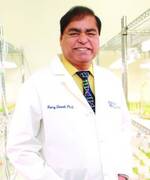Author Interviews, COVID -19 Coronavirus, Dental Research / 09.12.2021
COVID-19: Specialized Gum Could Trap Virus, Limiting Spread and Disease Severity
MedicalResearch.com Interview with:
Dr. Henry Daniell Ph.D
W. D. Miller Professor & Director of Translational Research,
Vice Chair, Department of Basic and Translational Sciences,
Editor in Chief, Plant Biotechnology Journal, Oxford, UK
School of Dental Medicine,
University of Pennsylvania,
Philadelphia PA 19104-6030
MedicalResearch.com: What is the background for this study?
Response: ACE2 is a human protein present in human cells, blood and saliva. In COVID-19 patients this protein is inactivated. SARS-CoV-2 virus enters human cells using receptor of this protein. ACE2 chewing gum utilizes two different mechanisms. ACE2 enzyme directly binds to the spike protein on SARS-CoV-2 and traps virus in the chewing gum. In addition, ACE2 enzyme binds to its own receptor on oral epithelial cells, thereby blocks entry of any virus that is not trapped in the chewing gum
(more…)



